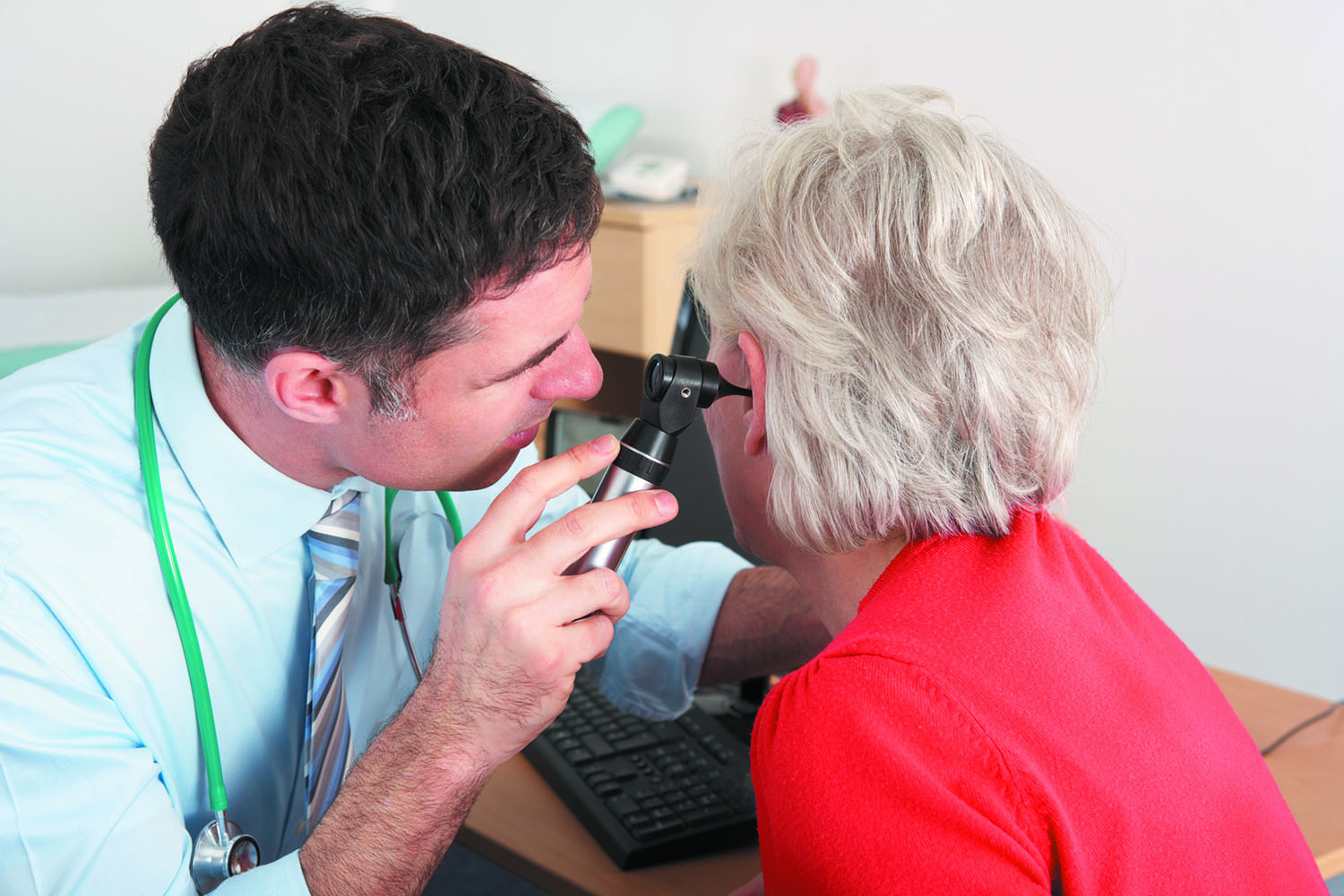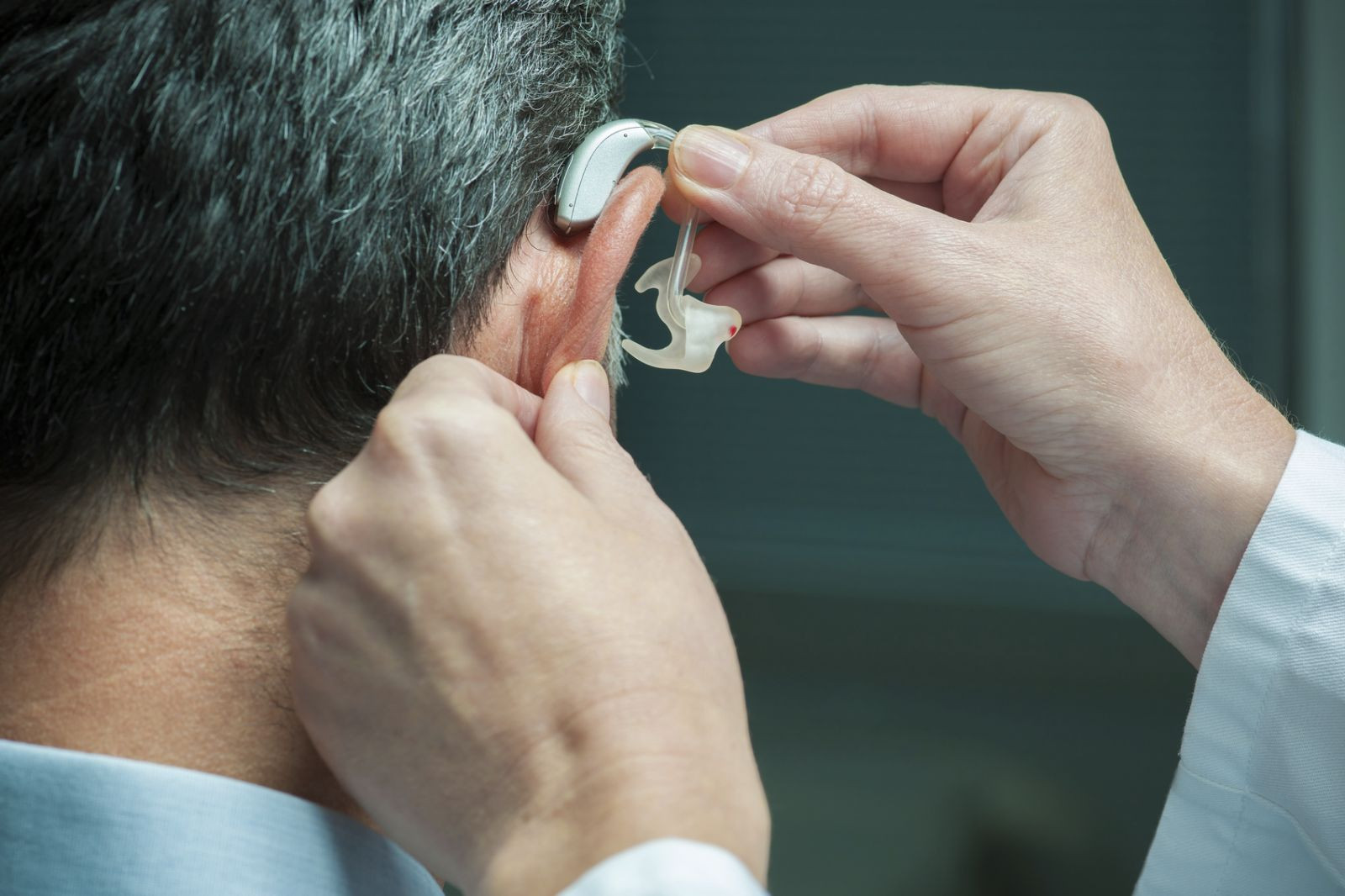
Daily cup of coffee may prevent afib recurrence

Gene-editing therapy lowers harmful blood fats in early study

What is EMDR therapy, and who can it help?

GLP-1 drugs versus bariatric surgery for treating obesity

Trying to lose weight? Be careful not to lose muscle

Two dumbbells, three exercises, and 10 minutes

Easing the emotional burden of IBS

Modify your push-ups to meet your fitness level

What is long QT syndrome?

Stroke survivors may benefit from very low LDL levels
Hearing Loss Archive
Articles
Hearing loss linked to late menopause, extended hormone use
Research we're watching
It was once thought that hearing loss in older women might be linked to loss of estrogen and progesterone following menopause and that hormone therapy might reduce that risk. Recent results from the Nurses' Health Study II indicate just the opposite — that late natural menopause and the use of oral hormone therapy are linked to a higher risk of hearing loss.
Researchers enrolled 80,972 women ages 27 to 44 in 1991. All completed periodic questionnaires on their health status and lifestyles. By 2013, 18,558 participants had reported hearing loss. When the researchers analyzed the results, they found that women who underwent natural menopause at age 50 or older had a 10% greater risk of hearing loss than women who reached menopause before 50. Compared with nonusers, women who used hormone therapy — either estrogen alone or estrogen and progesterone — had a 15% greater risk of hearing loss if they used hormones for five to 10 years and 21% higher risk if they used them 10 years or longer.
Is vertigo caused by a magnesium deficiency?
Ask the doctors
Image: © ayo888/Thinkstock
Q. I suffer from vertigo and have heard that taking a magnesium supplement might help. Is that true? If so, how much should I take?
A. Vertigo can be caused by almost anything that interferes with the normal function of the inner ear, which is instrumental in preserving balance. The most common form of vertigo — benign paroxysmal positional vertigo (BPPV) — results when tiny calcium carbonate crystals migrate from one part of the inner ear to the semicircular canal in another part of the ear, triggering a false message to the brain about the direction in which the head is moving and the speed of its motion. Dizziness is a result of the brain's attempt to resolve the conflicting messages from the ear and the other senses.
Keep on driving
Your health can go downhill after you lose your driving skills. Here's how to stay behind the wheel as long as possible.
Image: © AGSTOCK1/Thinkstock
One of the best ways to stay healthy is to keep driving. "Driving makes you more independent so you can get out of the house more to socialize, visit your doctor more often, go exercise, or simply enjoy the outside," says Dr. Anthony Zizza, a gerontologist with Harvard-affiliated Beth Israel Deaconess Medical Center.
Losing the ability to drive can have the opposite effect. Research published online Jan. 19, 2016, by the Journal of the American Geriatrics Society reviewed health-related data for drivers 55 and older and noted that their health worsened after they stopped driving.
Should you consider a low-cost hearing-aid alternative?
Some personal sound amplification products may perform as well as costlier hearing aids.
Image: © shironosov/Thinkstock
If you're hearing more about hearing lately, there's a reason. In October 2015 the President's Council of Advisors on Science and Technology issued a report on the sorry state of hearing in the United States. In June 2016, the National Academy of Sciences came to similar conclusions. Both acknowledged that as many as 85% of people with hearing loss aren't wearing hearing aids, citing two significant barriers to better hearing — the FDA requirement for having a hearing test before you purchase a hearing aid and the cost of the devices, averaging $1,000 to $3,000 per ear.
Why hearing aids cost so much
One of the reasons hearing aids have been so expensive is that the process of adjusting them is often bundled with the cost of the devices themselves. Medicare — and most other insurers — don't cover either hearing aids or the tests required to adjust them, but they do cover a hearing and balance exam that can distinguish age-related hearing loss from a hearing impairment that stems from an underlying condition. Dr. Mark Sanders, an audiologist at Harvard-affiliated Massachusetts Eye and Ear Infirmary, recommends getting that initial exam. "Anytime you suspect you have a hearing loss, it's always best to seek out a professional to get a legitimate diagnostic test. That way, you can determine if it's necessary to get a medical evaluation by an ear, nose, and throat physician," he says.
Take steps to protect your hearing now
News briefs
A study published online March 2, 2017, by JAMA Otolaryngology–Head & Neck Surgery suggests that hearing loss is going to become a major public health issue. Using current hearing loss estimates and population projections, scientists concluded that hearing loss among adults 20 or older in the United States will go from about 44 million in 2020 to almost 74 million in 2060, with the greatest increases among older adults. The climb is expected to be gradual, except between 2020 and 2030, when researchers project that mild hearing loss among people ages 70 to 79 will jump from about nine million to 12 million people.
The study doesn't prove that hearing loss cases will increase. But scientists are urging greater attention to hearing loss prevention. Protect your hearing by wearing earplugs if you know you'll be around loud noise. For more, check out the Harvard Special Health Report Hearing Loss (www.health.harvard.edu/HL).
Make your voice heard!
Project better and reduce breathiness with voice therapy, hydration, and a bit of homework.
Image: © Ralf Nau/Thinkstock
Older adults have plenty to say, but changes to the vocal cords, nerves, or lungs sometimes make it harder to speak up. The voice may become soft or breathy, or it may grow hoarse, rough, or strained. "This sets up a real challenge for people to communicate. It may be difficult to speak over noise in a restaurant or in a group. It can be very isolating," says Barbara Worth, a speech-language pathologist at Harvard-affiliated Beth Israel Deaconess Medical Center.
Age-related changes
The vocal cords are twin bands of muscles that open when you breathe and close when you swallow or speak. They are located in the voice box (larynx) on top of the windpipe (trachea), and they vibrate and make sound as you exhale and air moves through them.
What to do for earwax
The ear's self-cleaning system usually prevents wax from accumulating. But wax impaction requires medical attention.
Image: © monkeybusinessimages/Thinkstock
If you are like 90% of Americans, you assume that wax is something to be cleaned from your ears regularly, and you may have tried using cotton swabs, toothpicks, bobby pins, or any number of other small implements to do the job. However, according to the American Academy of Otolaryngology–Head and Neck Surgery Foundation, you are not only performing an unnecessary task, you are risking hurting your ears and jeopardizing your hearing. The academy's new guidelines on earwax repeated a familiar warning — "Don't stick anything smaller than your elbow in your ear."
Dr. Rachel Roditi, an otolaryngologist at Harvard-affiliated Brigham and Women's Hospital, agrees that there usually isn't much reason to clean one's ear canals: "I advise people that the ear has a lot of self-cleaning mechanisms already and so you usually don't need to do anything. Just let the ear do its job."
Easier access to hearing aids
The FDA announced in December 2016 that it would no longer enforce the requirement that adults receive a medical evaluation or sign a waiver prior to purchasing most hearing aids.
What is holding you back from better hearing?
The realities of treatment can help relieve hearing loss concerns.
Image: © Thinkstock
Hearing loss is common in older age. It affects one in three people ages 65 or older, and two out of three people ages 75 or older. The condition leaves people struggling to keep up with conversations or simply hear the phone or TV, which can lead to serious problems. "Hearing loss can make a person less likely to engage with friends and family, which can be associated with depression," says Dr. David Jung, an otologist (ear specialist) with Harvard-affiliated Massachusetts Eye and Ear Infirmary.
Common excuses
What you should do
It's easy to overlook evidence that you have hearing loss. The symptoms can be subtle. Perhaps people around you always seem to be mumbling. Perhaps you have a hard time carrying on a conversation in a noisy environment.
If you recognize these symptoms, talk to your primary care doctor. He or she may order a hearing test directly or refer you to an otolaryngologist (ear, nose, and throat specialist).
A visit will likely involve an ear exam, an evaluation of your medical history and how it may be affecting your hearing, and a hearing test by an audiologist. Your team will determine if a hearing aid will help you.
If you can hear the sound of a voice well but have trouble distinguishing the words being spoken, first try some simple tricks. Stand closer to people when they talk. Talk in well-lighted areas so you can see the face of the person you're talking with. Sit closer to a stage if you're at a performance.
What to do about the high cost of hearing aids One of the biggest obstacles to getting hearing aids is money. "Many of my patients are desperate to get a hearing aid, but they can't afford one," says Dr. David Jung, an otologist with Harvard-affiliated Massachusetts Eye and Ear Infirmary. A pair of the devices can cost an average of more than $4,600, yet insurance and Medicare rarely cover any costs. If you need financial assistance, some organizations can help:
The Hearing Loss Association of America (www.hearingloss.org) offers a complete list of resources. Eligibility requirements for hearing aid financial assistance vary. For example, Audient requires that a family of two earn less than about $36,000, and a single person earn less than about $27,000. A move by the FDA is making it easier to obtain over-the-counter hearing aids, which are less expensive than prescription hearing aids. However, over-the-counter devices aren't right for everyone. |

Daily cup of coffee may prevent afib recurrence

Gene-editing therapy lowers harmful blood fats in early study

What is EMDR therapy, and who can it help?

GLP-1 drugs versus bariatric surgery for treating obesity

Trying to lose weight? Be careful not to lose muscle

Two dumbbells, three exercises, and 10 minutes

Easing the emotional burden of IBS

Modify your push-ups to meet your fitness level

What is long QT syndrome?

Stroke survivors may benefit from very low LDL levels
Free Healthbeat Signup
Get the latest in health news delivered to your inbox!
Sign Up










